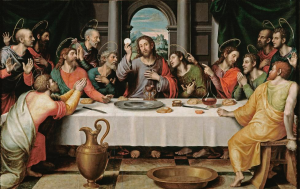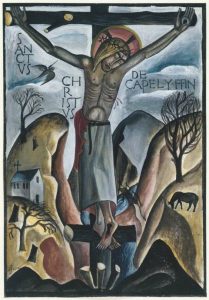HOMILY EASTER SEASON WEEK 06 06 – Year I
Mysterium Tremendum
(Acts 18:23 -28; Ps 47; Jn 16:23-28)
**********************************************
Do you see yourself as walking in the “Way of the Lord?”
Actually, we are the descendants of those who did, called to live the Mysterium Tremendum, the Paschal Mystery of Jesus as the way to new life and true human freedom.
The readings for today take on a deeper flavor when seen in the context of the liturgical season. It is the last day before Ascension Sunday that serves as a kind of second Palm Sunday, beginning as it does a second Holy Week leading up to the celebration of Pentecost. That was especially true for Mary and the disciples gathered in the Upper Room, keeping vigil.
 Significantly, the gospel begins with the same sentence as all week: “When Jesus knew that his hour had come to depart from this world and return to the Father.” His “hour” was mentioned at the temptations in the desert, reappeared at the wedding at Cana, and occur again here at the Last Supper and the Cross.
Significantly, the gospel begins with the same sentence as all week: “When Jesus knew that his hour had come to depart from this world and return to the Father.” His “hour” was mentioned at the temptations in the desert, reappeared at the wedding at Cana, and occur again here at the Last Supper and the Cross.
This phrase reminds us that these are Jesus’ last words, and therefore not to be taken lightly, along with the activity of the first disciples, followers of The Way of the Lord. The focus here is on the Last Supper and the passion of Jesus before the Ascension. On the other hand, the reading from Acts centers on the apostolic preaching after Pentecost about the Way and Jesus as the messiah, while the psalm intuits Jesus as King.
This all adds up to an invitation for us to live the six stages of the Paschal Mystery, the Mysterium Tremendum, of Jesus: Passion, Death, Resurrection, Appearances, Ascension and finally, Pentecost.
 These stages for us become: Hurt, Loss, Survival, Grieving, Forgiveness and New Life. No one gets through this life without being hurt, angry and resentful (our passion). Every time we are hurt, we lose something – a relationship, peace, wellbeing, etc. – leaving us sad and sorrowful (our death). We are still alive, however, but many of us are survivors (dry drunks in the 12 Step program) needing to forgive, to be forgiven and to heal (our Resurrection). That healing begins with grieving our losses and letting go of sadness and self-pity (our Appearances). Mary Magdalene is our model here, as she had to grieve the loss of Jesus and not cling to him. The healing continues at a deeper level when we let go of painful emotions like anger and resentment through forgiveness (our Ascension). Finally, forgiven and healed, we can now receive the Spirit of new life (our personal Pentecost).
These stages for us become: Hurt, Loss, Survival, Grieving, Forgiveness and New Life. No one gets through this life without being hurt, angry and resentful (our passion). Every time we are hurt, we lose something – a relationship, peace, wellbeing, etc. – leaving us sad and sorrowful (our death). We are still alive, however, but many of us are survivors (dry drunks in the 12 Step program) needing to forgive, to be forgiven and to heal (our Resurrection). That healing begins with grieving our losses and letting go of sadness and self-pity (our Appearances). Mary Magdalene is our model here, as she had to grieve the loss of Jesus and not cling to him. The healing continues at a deeper level when we let go of painful emotions like anger and resentment through forgiveness (our Ascension). Finally, forgiven and healed, we can now receive the Spirit of new life (our personal Pentecost).
It is this living of our Paschal Mystery, following the new way of Jesus risen, that leads to genuine human freedom from sin, from fear, from the slaver of addictions, from anger, resentment, sadness and self pity. We are given the freedom to love and be loved through forgiveness, trust and acceptance. The words of St. Irenaeus become true for us – “The glory of God is man and woman truly alive!”
Someone who is a follower of this way is Rick, who grew up with an abusive father in a dysfunctional family. On the border of being driven to resentment, he decided to do what Jesus advised in Matthew 18:15 – go to the one who hurts us and “point out their fault” or in today’s terminology, tell them how we feel. He wrote an open letter to his family about their father, doing just that with love, without any attempt at revenge or trying to change his father.
The first response was from his mother who chastised him for daring to address his father that way. His siblings responded in a similar manner. His father wrote back asking what was wrong with a little nip now and then. Although Rick was disappointed, he found that this letter released him from the anger and resentment that was building up within him. After his father died, he found a copy of that letter and discovered that his father went on to share some of the hardship of his life that Rick had overlooked in his reaction to the first comment by his father. That brought his healing into even greater completion. Rick had lived the Paschal Mystery through writing that letter out of love.
The Eucharist encompasses the Paschal Mystery; makes present the love of Jesus shown for us on the cross that redeemed us; forgives and heals us through the power of the Spirit, and empowers us to go out and lives of true human freedom.
So, let us live the Paschal Mystery as the way to new life and true human freedom.



